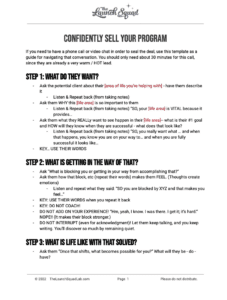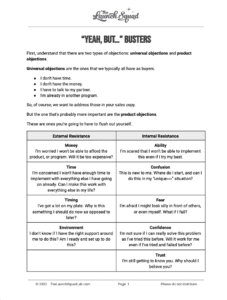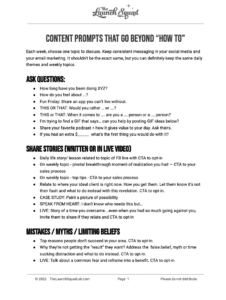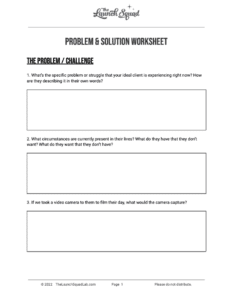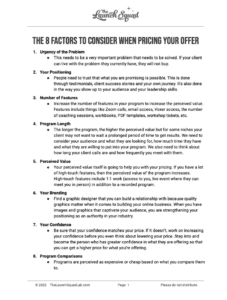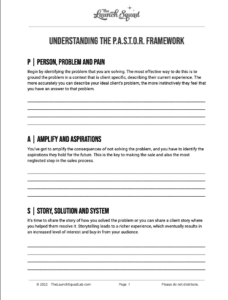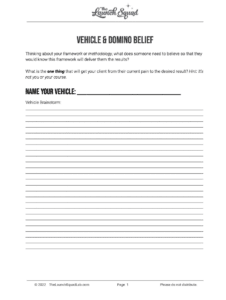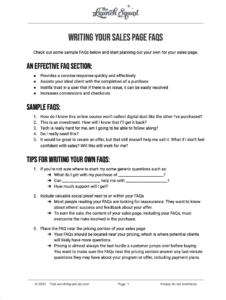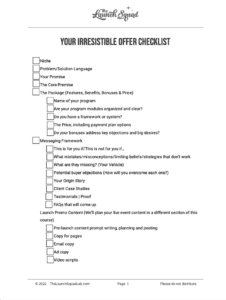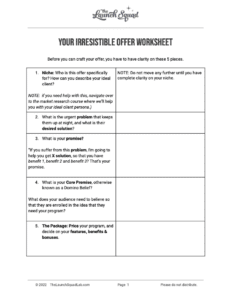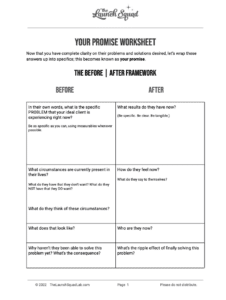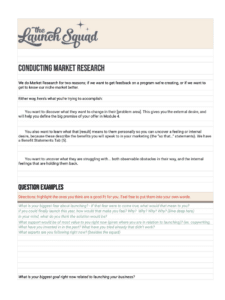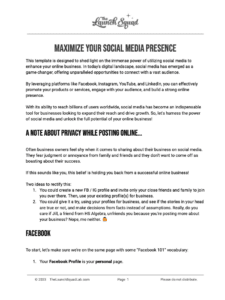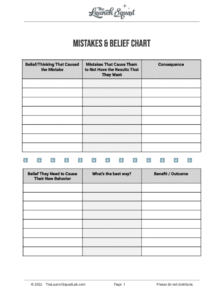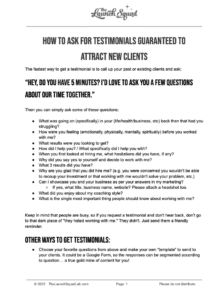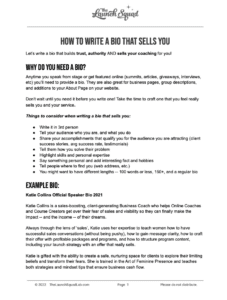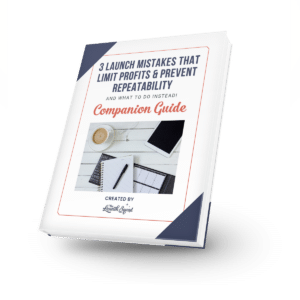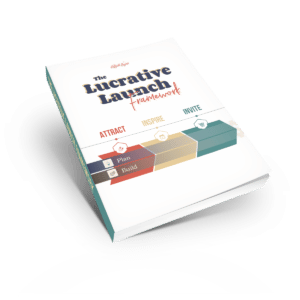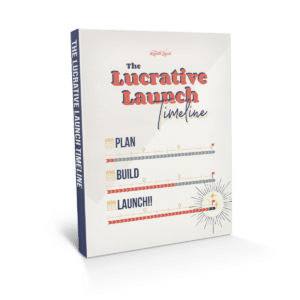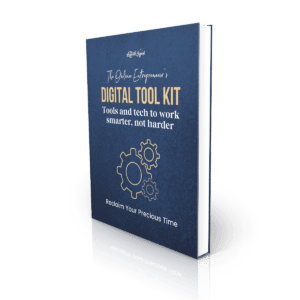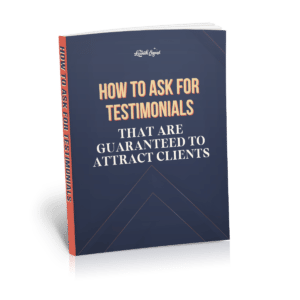After leaving her corporate position, she founded her company Follow Up Sales Strategies. Her career is now devoted to helping sales professionals, entrepreneurs, and business owners improve their follow-up and relationship management skills. What she teaches is tried, tested, and proven.
Connect with Wanda Allen:
[00:00:00] Jeffrey: Welcome to the light your launch podcast today, we're talking about a secret F-word that will get you. More clients and close more sales stay tuned.
[00:00:58] Jeffrey: Welcome back to the show. There's a magic word that brings abundant wealth and prosperity to all who follow it's wisdom. That word of course is.
is. Follow-up.
It's where the fortunes of the dedicated are made. And for many considered a dreaded and mundane waste of time. I'm Jeffrey som I'm backing out with Katie Collins and today we're revealing why the fortune is truly in the follow-up and how you could be missing huge opportunities.
If you avoid it as always, Katie, please reveal our special guest.
[00:01:28] Katie: She is an international speaker, coach and corporate trainer. And she's the author of two books. Follow up sales strategies and follow up.
up savvy,
Prior to founding her company. She had a very successful 25 year corporate career as a business banker and worked with sales teams throughout her corporate career.
She managed SBA departments that did a hundred million in annual loan volume. And it was through that experience that she developed a very strong skill for creating systems. After managing those SBA departments for 15 years, she accepted a position as a branch manager, which put her into. into. sales.
One of the first things she did in her new position was she thoroughly studied the sales process and discovered how critical follow-up is to every single stage in the process.
She decided to take her strong skill in creating systems and applied it to the followup process. And within nine months of having the systems in place, she brought in her first million dollar account and has had many successes since then, after leaving that corporate position, she founded her company up sales strategy.
Her career is now devoted to helping sales professionals, entrepreneurs and business owners improve their followup and relationship management skills. What she teaches is tried tested and proven. Welcome to the podcast stage. Wanda Allen.
[00:02:51] Jeffrey: Welcome.
[00:02:52] Wanda: great to be here. Thank you.
[00:02:54] Jeffrey: for being here.
[00:02:57] Wanda: Thank you for having me.
[00:02:58] Jeffrey: I'm, I'm curious, like why, why is the follow-up so important?
[00:03:05] Wanda: Because research tells us that only 2% of sales are made on the first contact. That means 98% of the time you have to follow up. If you don't follow up, you're going to lose the business. You know, if all we had to do was talk to a prospect one time and never put forth any further effort in the business just came in.
Wouldn't that be a beauty, but it doesn't work that way. You've got to do the follow-up work.
[00:03:35] Jeffrey: So what does that, what does that really mean though? And go ahead, Katie. I know you had a question.
[00:03:39] Wanda: And a,
[00:03:40] Katie: Well, like, I know that there are like fundamentals that have to be in place. Cause there's knowing about the importance of followup and then there's actually doing it.
[00:03:48] Wanda: it.
[00:03:49] Katie: So with tell, tell us about those fundamentals, um, around that.
[00:03:54] Wanda: that. Yeah. I love that. You said that because everybody knows how important follow-up is.
Everybody knows they need to. But so many don't do it. And there's a variety of reasons. One is the fundamentals just aren't there. And to be good at anything, you have to have the fundamentals in place. In fact, it's been said to be an expert at anything, you've got to be a master at the fundamentals. And so the fundamentals of follow-up are where it all starts.
That's the foundation. First fundamental is having the right mindset. You know, if the mindset isn't right, you will trip yourself up before you get out the door or make that phone call or send that email or text. And, you know, I could teach the best systems on the planet, but if the mindset's not there, it's just not going to work.
Primary issue with mindset is fear. There's so. Fear associated with following up, which is a huge reason why people don't do it. Fear of being uncomfortable, fear of being pushy. I hear that one all the time. The Goodall fear of rejection, fear of being uncomfortable. It's uncomfortable for a lot of people, a fear of not knowing what to say.
Communication's a real problem today, and it's not just the younger generation. All generations because we're communicating predominantly electronically, you know, and we're to the point where people aren't even spelling words out anymore, they can't even spell. Okay.
they're doing K you know, I mean, that's where we are in the beautiful skill and art of communication is lost.
And that feeds fear, you know, not knowing what to say or how does. So that's that's the first fundamental is you got to have the right mindset. And then secondly is you have to use a CRM stands for customer relationship manager. Uh, if you're not using a CRM, the process is so much more difficult. You're doing what I call slipping and sliding all over the place.
And that's exhausting. And, uh, as CRM puts you on firm ground. And so you got to use a CRM and then the last fundamental is which this sounds so elementary and common sense, but it's not common yet. Gotta make it a priority. Barry, but people don't, they don't, you know, the number one reason why I hear people can't get their followup work done is because they don't have the time.
They're just too busy. I've heard it a gazillion times and I never ever believe it. It's not about the time. So those are the, the that's where it's where you got to start. You got to get those in place and on the right track so that you can get in the flow of ease of getting this crucial work.
[00:06:45] Katie: You know, the irony of not enough time is because they're going back out to get more leads. Right? So it's like that constant hustle of trying to get more leads. When if you just spent a little bit more time on the leads you already have, you could probably convert more. You will not, could probably, you will convert more.
Um, so that time thing is funny.
[00:07:06] Wanda: Yes. And, you know, people spend so much time, energy effort, money in that lead generation, which so many people feel that's the easy part.
That's the comfortable part. That's why they do it so much, but they fall so short on the back end work, which is following. That, you know, they'll never experience near the fruit of all that labor. They're putting out, getting those leads. And that pains me because people are working really hard, you know, but getting a late is not going to bring business in it.
That's the start it's that plants a seed, but you gotta, you've got to follow up to nurture that to blossom into a yes or a no.
[00:07:49] Jeffrey: So it sounds to me like that you do need both. I mean, you can't stop
[00:07:55] Wanda: I mean, you can't
[00:07:55] Jeffrey: getting leads and just focus on follow-up you can't just focus on follow-up and you know, so, um, what, what's the balance and what's the right way to sort of balance those two worlds and, well, how do we, I guess, going back to the systems idea, right?
How do we balance those two?
[00:08:16] Wanda: How do we balance those two?
Well, you have to have the leads or there's nothing to follow up on. And so lead generation is really crucial, but it doesn't stop there. And that's where so many people stopped. So really you should, you should have follow-up work to do every working day.
You know, if you don't your pipelines to. And, you know, sales is a numbers game. The more robust your pipeline is, the more opportunity you have to close business. And so what happens when people stop at lead generation or they might follow up once, maybe twice and then quit the pipeline, doesn't have an opportunity to grow and you, you become the hamster on the wheel, you know, running, running, running, but they're just not getting where you want to be with your sale.
And so see it through to a yes or a No.
don't just stop once you get the lead. So there, you know, it's, they go hand in hand,
[00:09:17] Jeffrey: Yeah.
[00:09:17] Wanda: got it. Yeah.
[00:09:19] Jeffrey: Uh, I'm curious about the systems part of it, because to me that whenever I hear systems, I'm like, yes, that's something that gives back time, right? When there's, whenever you can put a system around something you've regained some time with it.
[00:09:33] Wanda: yes, So the mothership of all systems is the CRM, because that's what houses, you know, I could again teach you the best systems on the planet, but if you're not using a CRM, it's just going to be so much more difficult.
So examples of systems are, you know, Well,
research tells us 80% of sales are made between the fifth and 12th contact, which I believe to be a spot on statistic. So how do you follow up 5, 6, 7 times. What do you do when you followed up four times and the prospect's never responded? That's where your systems come in, because when you have systems to overcome those situations, you always know what your next step.
If you don't know what your next step is, it opens the door for emotions, uncertainty, uh, discomfort, the guessing game. I'm not sure. I don't know. I feel like I'm being pushy and you know, and that's not a good road to go down. So when your systems are in place, it's about your systems and your guided with your always knowing what the next step is.
And then the extension of following up is relationship management. You know, how. Consistently stay in touch a year, goes by in a quarter either way. I mean, can you believe the first quarter's gone already? So a year Could go by and you think, oh my gosh, I haven't talked to them or two years, and now you want something or you need to call them for something.
And you're embarrassed because you. haven't talked to them in two years. And so that's again where systems come into place, you know, making sure you're consistently following up. So those are examples, but it all starts with the senior.
[00:11:14] Jeffrey: And could you describe some of the systems like I'm trying to envision, um, you know, an entrepreneur out there who's trying to juggle all the things and use, you're saying I've got an outreach out 10 or 12 times to this person that got onto my email list. So is it.
[00:11:33] Wanda: is it. like
[00:11:34] Jeffrey: 12 phone calls. Is it 12 emails?
Is it a mix of both? What does that system look like? Is there opportunities for automation? And if we automate it,
[00:11:44] Wanda: Automated,
[00:11:45] Jeffrey: how do we not continue to reach out to them automatically when they've already signed up? Like what, what kind of systems are available?
[00:11:56] Wanda: well, I teach a whole system for that. So that's a very deep subject. Um, but I can answer it on the surface is when you're following up to close that business or get the next meeting booked or find out what their decision is.
Always use the phone. You know, the phone is the most efficient tool we have, but it's the one that used the least. There's so much fear around the phone and it, a lot of it goes back to not knowing what to say or how to say it. And the reason it's so efficient is because I can cover with you in a five minute conversation.
What could take three emails in three days? And you're going to tell me things on the phone that you won't tell me in an email. And so what happens is because we're so electronically minded and because there's so, and you couple that with so much fear around follow-up people are hiding behind their emails and texts and electronic means of communicating, but it is not the most efficient.
So when you're following up for that next step, Always use the phone and then use this use a electronic means of communication as your secondary, not your primary. And, um, that's where it's backwards for a lot of people.
[00:13:19] Jeffrey: I'll be the first to admit I'm guilty of that. I definitely, I'm not a phone person reaching out and calling somebody who's not my go-to emo.
[00:13:30] Katie: So Wanda, let's, let's talk about that for a minute because, um, I know you teach all sorts of people and I know this audience is really the online entrepreneur. And so a traditional funnel for us is, you know, download my free PDF and they're going to enter their name and email. And we often don't ask for a phone number because people are really put off.
And we'll end up not getting the lead because they don't want to give our phone number. Um, now we're hosting an online summit and we asked for a phone number in that case, um, because we want to be able to text people reminders, and we know texting is a great tool.
tool.
So all that to say, I wouldn't have a phone number until they booked a sales call with me. and that is where I'm picking up on. What you're saying is like, if you have a sales call with someone and they're a, not yet, or I need to think about it, or I gotta talk to my partner or all the other objections out there.
Um, and we set a follow up call or maybe some people forget to even set the follow-up call. What you're I think suggesting is that's when you're calling them, you're not going to put them in an automated email system and hope that they open it.
open it.
You're going to pick up that call and that's when the 10 to 12 outreach opportunities happen when someone's moved from kind of the cold to warm or even warm to hot.
Cause they booked a call.
[00:14:57] Wanda: right?
So if all you have is their email, that's all you have. But you know, when they're getting warmer and when it is time to now converse and not just communicate electronically. Yes,
[00:15:09] Katie: Yup. Yup. And I know I've made the mistake of, um, not requiring a phone number no longer do I do this, but because I thought, oh, well, I'm meeting them on zoom, so I don't need their number, but yes, you do need their number. So always require a phone number. Um, if, if that's a mistake that people are making, I'm curious, what CRM do you recommend?
Cause I've tried a few. I found them to be very clunky and I probably have a system that you might laugh at, but I'm curious, what do you recommend for people to use?
[00:15:42] Wanda: So I wish I could say this is the CRM for everybody, but I can't do that because we're all different.
So people want to know what I use. It's a very funny name. It's called lesson knowing. And, um, am, yes, I am an affiliate with them. So if any of your listeners try them, use my name, you'll get 60 day free trial. I don't care if you use less annoying or. All I care about is that you get one that you like and that you'll use.
So, you know, there's hundreds out there. Pipe drive P I P E drive is another good one. HubSpot, H U B spot. You know, there's just so many. And what I will say is less, is more simpler is better because, you know, we live in an incredible time of technology. If it's too complex and complicated, your chances that you may not use it.
Because it be overwhelming and I don't have the time. And if you've used some that are clunky and that's not the program for you, because if it's clunky, you're not going to use it. So the, the best CRM out there is the one you will use. That's the best one. We're all different. There's no right.
wrong, good or bad.
Don't feel like you have to make a huge investment because you don't, uh, less annoying as $15. One, five a month. pipe drive has a package for 1250. So, you know, the, the. Out there, but proceed caution, know, what we get for Yeah. and it's too, don't be penny-wise and pound-foolish the more complex and sophisticated it is the higher the price point.
But even the lower price point ones, they're very relative and, and, um, relevant, I should say. And they're very, very good.
[00:17:28] Katie: So let's dive into the mindset piece. Um, before we connected with you, I said, he said, what's the narrative. And I said, oh, it's going to definitely be about mindset because people always think they're bothering people. And, and it's why people don't pick up the phone and call because we do have this kind of, oh, who's this calling, right?
Like last night I got a call. It was. 30. And my partner said, well, aren't you going to answer that? And I'm like, no, it's six 30. Who calls someone at 30 besides salespeople? Meanwhile, it was a very important call. Um, but, um, I think people, you know, just have all that mindset around. I don't want to bother people or, you know, the minute they see my number and if they.
they.
Send it straight to voicemail. It's like our ego gets a little hurt. So what do you say to people to help them overcome that? Because truthfully, we got to pick up the phone and make the call.
[00:18:23] Wanda: Right. So, um, the tendency is because we're a certain way. We think everybody else's that way. And so, and, and that is not the case. You're if your job is to bring in sales, um, that's what you've got to do. You've got to follow up.
If you're, you're not being a pest, you're doing your job. And so one thing that can help soften that is. Don't focus on making the sale focus on serving that prospect with your product or service, because when you come from a place of pride of serving, it makes it easier to follow up. And actually when you have that mindset, if you don't follow up, you're doing a disservice, not only to yourself, but you're doing a disservice that prospect, because you're not giving them an opportunity to do business with you.
And, you know, you can make a difference. In their life or business with the product or service yourself. That's the mindset that will really support you if you're not a PEs, especially if a prospect has peaked interest in what you do. You're definitely not a past,
[00:19:33] Katie: You know, it reminds me, um, Jeffrey and I went on a sales call to be purchasers buyers of a thing that was upwards of $8,000. And we were like, yeah, we just need to kind of start the financing and then we'll be ready probably in a month or something like that. And he never followed up with us. It was in January and I still, to this day, I'm on their email list, but I don't want to even open their emails.
Cause I'm like turned off by the fact that their sales person never wants reached back out to us. I thought we were a warm to hot lead for that guy. Like why, you know what a mistake. I mean, he really left a sandal on the table there. If he had followed up, we probably would have done it.
[00:20:14] Jeffrey: We definitely, probably
[00:20:15] Katie: I just want people to hear that.
Yeah.
[00:20:17] Wanda: Yeah.
I hear those stories all the time. All the time. And research tells us that, um, well, older research said that 48% of people never follow up. And I never was an agreement with that because I always thought it was so much. Newer research is saying 79% of people never follow up that I'm on board with.
That's how bad it is out there. And you, you just shared your story. I, I, I hear those stories all the time. And, um, so what I want to say is to your listeners here. Commit and get your arms around your follow-up responsibilities, because there's so much more opportunity for you because people don't do it.
And when I say people I'm talking about your competitors, and so it's really being open to that. And Yeah. I mean, 90% of people follow up twice or less and then quit. But if 80% of sales are made between five and 12 contacts, how much opportunity is that for the, what I call the elite 10% that are willing and able to make three or more contacts.
That's a low bar, but that's where we are today.
[00:21:34] Katie: Yeah. Yeah.
[00:21:35] Wanda: not hard to stand out and wow. Your prospects.
[00:21:39] Jeffrey: So, how do we know when to stop? How do we know that it's no longer
[00:21:43] Wanda: no.
[00:21:44] Jeffrey: a good idea to keep following up?
[00:21:46] Wanda: yeah. Again, I teach a whole system for that. Um, what, what I will say is that you follow up until you get a yes or a no, and you know, there's a whole process to it that, you know, I can't get into here, but that's what you're looking for.
You're looking for a yes or no, just because somebody is ignoring you does not mean they're not interested in. What happens is the reason people stop after. So few times is they assume the prospect isn't interested. And when you assume a prospect isn't interested, you have just made the buying decision for them.
You know, and none of us are qualified to do that. And so if you will just start at that commitment, okay. I'm going to follow up until I get a yes or no, just because they are not getting back to me does not mean they're not interested. I can't, I, I couldn't even count. The thank yous and I'm sorrys. I have gotten over the years because I keep following up and I keep following up.
And then when they finally respond, oh my gosh. Thank you so much for following up. I'm so sorry. I haven't gotten back to you. I couldn't even count because people appreciate it.
[00:22:57] Katie: Yep. I love that perspective. It's so important because people feel seen and heard and here we are in our egos over here going, oh, they're going to think I'm salesy or I'm bothering them. And it's the direct opposite is true for the most part. Right.
[00:23:15] Wanda: it is.
[00:23:16] Katie: Uh,
[00:23:19] Wanda: You're you're showing interest is what you. When you're following up. And when you look at it from that standpoint, you know, look we love when people are interested in us, don't we, it feeds our ego, right. So that's what you're doing is you're showing interest. It's all between the ears and how you view.
then, you know, when we were talking about, feel like I'm being a pest, listen, the only thing you're responsible for is your action. You have no control over. If they're going to answer the phone, are they going to send you to voicemail? Are they going to think I'm a PA you forget about all that. Don't put energy there.
[00:23:56] Katie: right.
[00:23:56] Wanda: just take the action. You need to take, let the chips fall where they may and carry on. Yeah,
[00:24:03] Jeffrey: I love, I love that you said that because I, you know, I'm not going to name names here, but, uh, I've witnessed people, uh, Either texting somebody, calling somebody and, and then making up all kinds of stories. Why they didn't answer why they didn't respond in time. Why they didn't like, oh, do they not like me anymore?
Oh, are we still friends? Oh, you know, like that seems like such a waste of energy, a rabbit hole that just doesn't work. I love how you're pointing out. Like you just don't make up those stories. Don't don't do it.
[00:24:38] Wanda: No.
[00:24:38] Katie: So I want to talk a little bit about what to say when you do follow up, because I think, um, I think there's some nuances and I'm curious what you'd like I had heard, you know, don't always make it about the sale. Like just following up with.
[00:24:54] Wanda: with.
[00:24:55] Katie: Sometimes I have a mortgage person that's been following up with me for years.
And so it's like happy Memorial day, like just kind of random emails. I'm like,
I'm like,
why do you pay for an email marketing system just to wish me, you know, happy holidays. Um, but what, what do you recommend for people? Cause sometimes it's really just the contact. Like it's a, Hey, don't forget that. As opposed to, Hey, do you want to buy this thing now?
How about now? How about, right. Do you have, do you teach any of that kind of nuance with what to say for follow up?
[00:25:25] Wanda: Oh Yeah. I teach scriptings in that, but for this purpose, I'm all about simplicity because life is complicated and complex enough on its own. I don't want to add to it. So I keep it really simple.
First of all, be very clear on what your intention is for that phone call, email, text, then. Say what you mean and ask for what you want. It's that simple. So when you know the intention, then you're going to say what you mean and ask for what you want. Don't sugar coat it, beat around the Bush, try to sandwich it in with something else, because that is when you're going to get tongue tied and twist it.
And this doesn't mean you're abrasive, you're polite, professional kind. You're direct. And we appreciate that. I just talked to somebody recently. He told me somebody's sales person called him. He, he said after about two minutes, I thought, what, what does she want? You know, she was just going here, there, and everywhere and he didn't appreciate it.
And so it's just being confident in who you are. As a salesperson and the product or service that you sell and, and confidence is so crucial in sales because at the end of the day, that's what people buy. You know, who doesn't Love a sales person who is confident in who they are and the product or service they sell.
That is what we gravitate towards. So be very confident, be clear and say what you mean and ask for white.
[00:27:00] Katie: Love it straight into the point.
[00:27:02] Jeffrey: All right. Don't beat
[00:27:03] Katie: I do agree. I don't like when people waste my time, like when it's several minutes of small talk and you know, I'm kinda like, all right, I got, I got stuff to do here. Um, you had said, stay in touch with those that are important to you. What does that mean? Is that like referral partners? Is it leads? Is it both? Is it all.
[00:27:28] Wanda: It's relationships. So what happens is what's very common and I'm gonna talk from the client's standpoint for A minute. You know, people put so much time, energy, and effort.
On the prospecting side, they get the business, they close it, they drop the relationship and they're off looking for their next new lead prospect and client forgetting about everybody they've already done business with. And that pains me. So did you enjoy getting to know. Prospect and turning them into a client.
Did you enjoy working with them? If the answer is just, don't let them go. Why? I mean, there's so much you, you, at the end of the day, you do business with people and life and business is about people. When you, you know, I call it the goldmine. When, when you are nurturing and taking care of your goals, mine, there's so much more opportunity for you with the people you already know, but before you can.
Take advantage of that. And I mean that in a very positive way, you've got to invest in your relationships and because people are, so we live in. In a crazed frenzy and relationship management is so low on the list and that makes me really sad and it's wrong. Listen, you got it. Take care of your people, whether it's a client, a prospect referral source colleague, you've got to take care of them because if you don't, there's somebody out there who. And you create and develop loyalty and life. Business is so much easier when we have loyal people. Don't you agree? I mean, it just is,
but you got to earn it. You have to earn it, you gotta work for it. And so that's what I mean by staying in touch and not neglecting important relations.
[00:29:17] Katie: So you don't think we should have a stack of business cards with a rubber band wrapped around them in the corner of our desk.
[00:29:26] Wanda: Uh, no, I I've declared that in epidemic in the business world. Uh, it is so rare that somebody doesn't have that situation on their desk. And that pains me too, because. How much money did went into getting that business card and then how much money potential, how much money in potential business is sitting in those business cards.
I mean, it's so wasteful to go to events, connect with people and then do nothing. So you know, that that stack represents so much. That's not good, but here's the sad. Is it, let's say you went to a networking event, got some business cards, come back to your desk, you put them on your, come back to your office, put them on your desk.
The sad part is there's a false sense of accomplishment because that event was against. And again, it goes back to what I said earlier. That's that that's just the beginning. And so that's what bothers me as people feel accomplished. And it's, it's just not right. You got
[00:30:36] Jeffrey: got a bag full of cards and I'm a winner. It's a winner who done sweet. Awesome.
[00:30:42] Katie: So, what is your recommended? Like do you think? Cause I've experienced some people that, um, man, they, they went home at eight o'clock that night and messaged me immediately. I thought, oh my God. Like when I go home at eight o'clock at night after networking and working all day, I'm done stick a fork in me done.
Uh, but what, what's your recommendation for how to follow up with those folks and, you know, do you have a script for that?
[00:31:08] Wanda: Well, it depends what the conversation is. You know, you've got to ask the next step questions and, and not be afraid to ask next step questions, because if you're afraid and you don't do it, you're letting a potential warmly.
[00:31:21] Katie: Hmm.
[00:31:22] Wanda: And then you're going to start guessing should I, I don't know.
I'm not sure. And when uncertainty kicks in, typically you don't take action. And so you've got to just make sure you're having the right conversation. So you know what to do when you leave.
[00:31:40] Katie: Yeah. Do you recommend people
write on the business card?
[00:31:44] Wanda: Yes. Because why rely on your memory? Memories fail us and it doesn't matter what age you are.
If you get six business cards and you get back to your desk and you're like, Oh my God. Now was she the one that wanted me to call next Wednesday? Or she, the one that wants to meet tomorrow? I mean, why do that to yourself? Don't torture you.
[00:32:05] Katie: yeah,
[00:32:06] Jeffrey: So are there things when we're thinking about the followup and we're trying to plan this out, are there things that you can tell us that we just, we cannot miss doing these things? Or are there things that we, we must avoid when we're doing the follow-up.
[00:32:24] Wanda: You must always follow up with your leads. Always like it has to be a non negotiable. You had, do not let a day go by that. You're not getting your follow-up. work done. So, you know, I say, I want it to be like, I'm checking email, voicemail, and text message. You would never go a day and not do that ever. And if you did, you'd probably have a hard time sleeping.
That's where I want follow-up to, before. You would never, it doesn't matter. What's going on, what kind of mood you're in, how you're feeling. You always get your followup work done and you know, that's a commitment you've gotta be committed to the growth of yourselves. That's what's going to grow yourselves.
That's the easiest way to grow your sales is to just follow up. So that is my number one. Non-negotiable always, always must.
[00:33:17] Jeffrey: I love that. I love that.
[00:33:19] Wanda: And that.
what not to do, don't quit too soon. That's the MOUs for what not to do.
[00:33:27] Katie: And I think that script's help here. I know you teach a, it sounds like you teach that as a system. Um, I know, um, It's not something I've necessarily done yet, but I do know that it's probably a smart move. Just to have an idea of what to say for email number one, like when you're in your CRM, you can have sort of a funnel of email templates that you can say now, this is what I'd like to say first time, you know, it was great meeting you.
I loved how we chatted about.
insert,
Whatever right. And then the second one, right? So that you don't have to sit there and think what should I email them? Cause I think that's part of the problem is that people aren't in like a creative mode, are they? And that's why they put it off. So do you agree, like if they had some sort of email template that they could start from, it makes the process, this non-negotiable process one that is a little easier.
[00:34:21] Wanda: Well, it, it falls back on saying what you mean and asking for what you want. So if, if email number two, Could very likely be the exact same as email number one, because they haven't gotten back to you. You know, don't feel like you need to recreate the will because if somebody expressed an interest, let's say in me, speaking to their group and they told me to follow up today and I sent him an email. Then, you know, the next time I follow up and they didn't respond back to me, I'm going to say the same thing. Why would I try and want to try to change it? You know what I mean? So it falls back on because I'm following up for the same exact purpose as I did the first time. So that's what I'm saying, you know, keep it simple.
Don't complicate it
[00:35:10] Jeffrey: Now I I've had, I've had some, uh, followup emails that, um, I do miss the first one and, you know, email Gmail or some email clients. They, they, uh, compressed the thread together. Right. So I'll see an email that says, Hey, did you see my last. Now do you recommend like, keep it simple like that? Or should we kind of reiterate the, the whole email or, or is there a
[00:35:36] Katie: The original email
[00:35:38] Jeffrey: yeah,
[00:35:38] Wanda: I went, you want to make it as easy as possible on the reader because we're, you know, we move fast. We don't want to work. We, you know, we don't want to have to hunt and dig and look so, no, I would, I went and say, Hey, did you see my last email?
I would say, you know, I sent you an email last week and then say the same thing. So they've got it right there in front of them and they don't have to go.
[00:36:03] Katie: Yup. Yup. Um, alright. I know it's almost time to wrap this up. I want to ask one more question because we brought up network.
networking.
And I think people know now that the world is opening back up again, but I know this is true for online networking as well as in-person, but I do, um, I do believe that we all kind of lost.
A sense of how to talk to people face to face. Cause we've been stuck at home for a few years now. Um, what do you recommend? How, how can we learn how to talk to strangers once again at networking events and really make that time that of our attendance work in our favor?
[00:36:42] Wanda: I think it's showing interest in the other person, you know, there's a philosophy be more interested than interesting.
And so that makes you more likable, you know, when you're, so why do you do, what kind of clients do you work with? Those questions are going to come back to. Um,
but it's you showing an interest? And so a lot of people get nervous with networking. I feel like I have to be salesy. I feel like I've got to, you know, push what I do on them and you don't, you don't.
And so that's, that's a strategy for getting around that is by being interested in the person that you're talking to.
[00:37:20] Katie: Awesome.
[00:37:21] Jeffrey: love it.
[00:37:22] Katie: All right. Well, this has been so informative. I think that, um, you know, the number one takeaway is do the followup in whatever way, right. But that is really the non-negotiable here. And you know, if you're sitting here thinking, gosh, I need more sales. And a lot of times we replace that with, I need more leads so that I can get more sales.
Right. But if the end result is that you want more sales, take a look at the leads. You already. Keep following up, right. Create that consistency because that is where that fortune is. And we hear it over and over. The statistics are astounding, you know, 79% never follow up. Like, you know, the fact that like your competition also isn't following up really makes the case for like, you know, a little bit of effort could, could go a long way.
And you know, you think to yourself listener, um, what you're selling, right? What package are you selling?
And
Like, if you could make an additional $8,000 just by making a followup call, wouldn't that be worth it? So, right. It seems a lot easier than sending up a whole new funnel. Um, so one that where can folks connect with you if they want to get in on some of this goodness themselves.
[00:38:36] Wanda: thank you. They can go to my website, follow up sales strategies, dot com. And there's a couple of different ways they can connect with me.
[00:38:43] Katie: Awesome. And did you have a free training? You wanted to let our listeners know.
[00:38:47] Wanda: I do, I offer a free workshop, uh, twice a month. And so they can register for that and it gives all the details, dates and what I cover, um, which. Good getting deeper into the fundamentals. So it's very worthwhile and yeah, I've got a free guide book there and there's some goodies and then if they want to, yeah.
If they want to contact me, they can do it through there.
[00:39:10] Katie: Alright. And then I bet you'll follow up.
[00:39:14] Wanda: You know, it, I do practice what I teach that I can guarantee.
[00:39:20] Jeffrey: I love that. And we'll, we'll definitely link that in the show notes and, uh, get people to connect with you, for sure. So thank you, Wanda, for, for your time. You've been so generous. Thank you.
[00:39:31] Wanda: You're welcome. Thank you for having me
[00:39:34] Jeffrey: And thank you listener for joining us. And if you enjoy this episode, please leave us a five-star review and hit that subscribe button. And you can check out all the show notes and how to connect with Wanda at the launch squad, lab.com forward slash episode 68. We'll see you next time.
Be the first to know
Enter your name and email and we'll let you know when new episodes release.
About the Show
The Lighten Your Launch Podcast is for Coaches and Course Creators who want a lighter online launch experience. Maybe you’ve done a few launches already, and feel exhausted just thinking about it! Or, it’s been one of your goals, but you don’t know where to start.
Tune in to learn from our team of experts, The Launch Squad, who aren’t afraid to dig into all aspects of launching: sales, strategy, technology, mindset, funnels, and even a bit of woo to get you through the toughest times. Let’s put a stop to perfectionism and procrastination, and finally take your launch from intimidating to money-making!

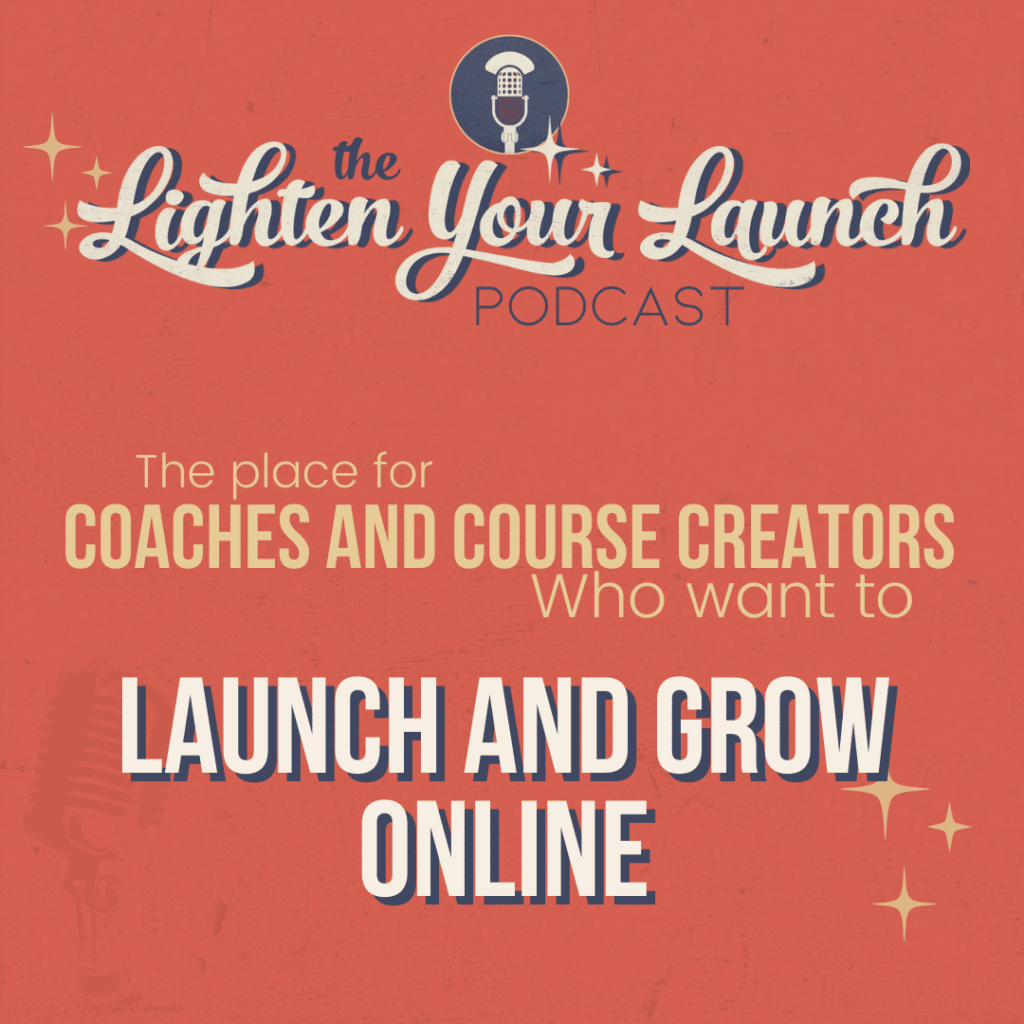
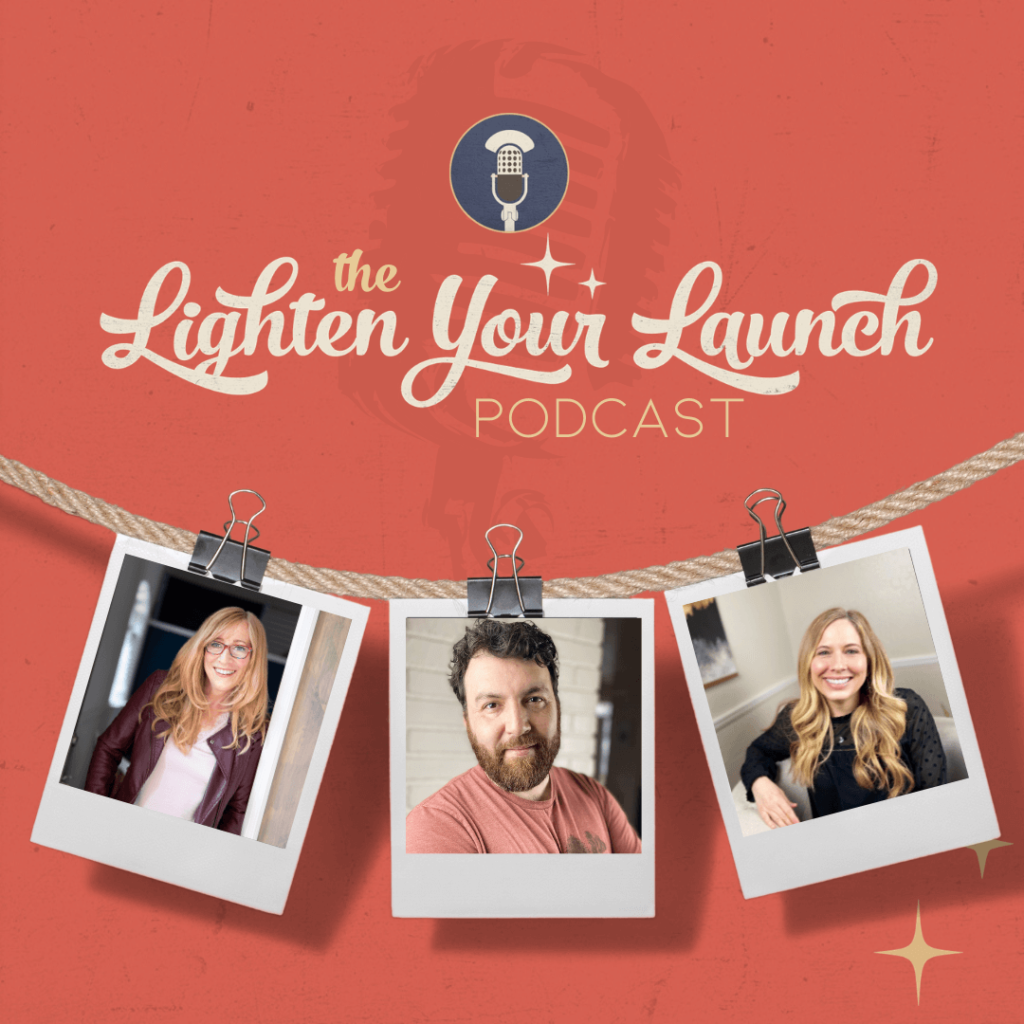


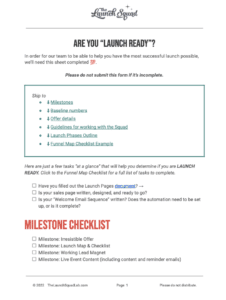
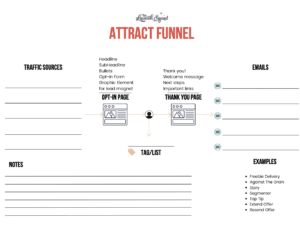
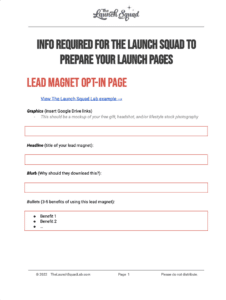
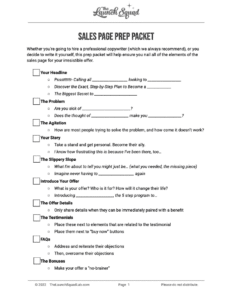
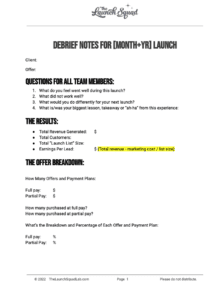
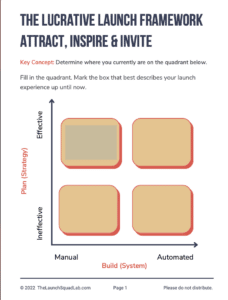
![Marketing Launch Calendar [TEMPLATE]](https://thelaunchsquadlab.com/wp-content/uploads/2023/05/Marketing-Launch-Calendar-TEMPLATE-300x260.png)
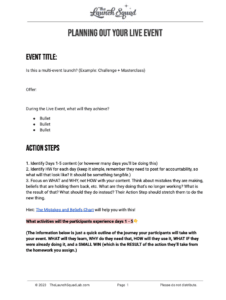
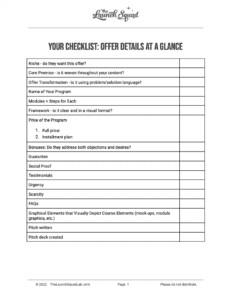
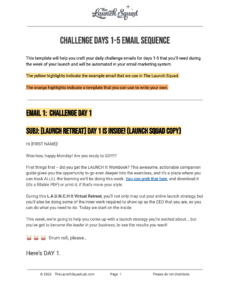
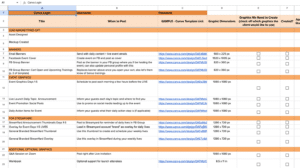
![[Updated] Email Templates for Launch](https://thelaunchsquadlab.com/wp-content/uploads/2023/05/Updated-Email-Templates-for-Launch-223x300.png)
![[REVISED] LS Pitch Script](https://thelaunchsquadlab.com/wp-content/uploads/2023/05/REVISED-LS-Pitch-Script-2023-226x300.png)

